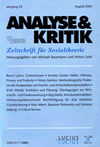Suchergebnisse
"Gerald A. Cohen"
Titel: G. A. Cohen and Marxism
Autor: Fabien Tarrit
Seite: 71-95
The philosopher Gerald A. Cohen died on the 5th of August 2009. His contributions were at first based on Marx’s thought. He really appeared on the intellectual stage in 1978 with his Karl Marx’s Theory of History: A Defence. Later on, he gradually departed from Marx’s theory. He discussed the libertarian concept of self-ownership and the possibility of associating it with a Marxist approach, before entering into the normative debate around Rawls’s Theory of Justice, while his Marxism was withering away. Based on Kantian philosophy, his critique of Rawls was that he allowed too little autonomy to individual choices. This paper discusses the consistency of Jerry Cohen’s intellectual journey with regards to his relation with Marx’s work.
Titel: Reply to Four Critics
Autor: Gerald A. Cohen
Seite: 195-222
Abstract: This article is a response to criticisms of my book on Karl Marx's Theory of History which were made by four authors in last Decembers number of ANALYSE & KRITIK. After clarifying (section 2) an ambiguity in an argument for historical materialism which is presented in the book, I contend (3-5), against objections raised by Philippe Van Parijs, that historical materialism is consistent only if it explains production relations functionally, by reference to their propensity to develop the productive forces. Next (6-8) I address and rebut the views of Wal Suchting and Milton Fisk, who both think that the role of class struggle in historical materialism is larger than the one I assign to it. Finally (9-12) I try to vindicate the doctrine of base and superstructure proposed in my book against the skepticism of Steven Lukes.

The Normative Turn from Marxism
2015 (37) Heft 1
Editorial
Marxism, both as a Western political movement and an intellectual focus of dispute, lost its academic appeal during the 1970s and 80s, foreshadowing the collapse of `actually existing´ socialism in the early 90s. Within what after the Second World War was called `Western Marxism´, there had been growing awareness of Marx’s early philosophy with its suggestive, if somewhat vague, ideas of a universally productive life and an ideal productive society. In contrast, the stock of (not only offici...